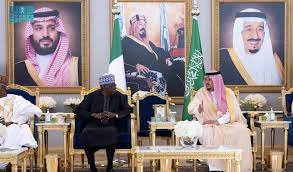Yahaya Lawal
From time immemorial, even long before the establishment of modern nations states in Africa and the Middle East, these two regions have had age-old interactions as neighbors bound by history and geography. Africa and the Arab world are known to have maintained fruitful exchanges in trade, culture and civilization through people-to-people contact.
With their shared space and populations, Africa and the Arab world are also tied by a common destiny and shared interest which, obviously, demands that they mutually cooperate for the benefit of their peoples. It was, therefore, not surprising that after the attainment of independence by most African countries in the 1960s, relations were prioritized with their Arab neighbors. It should be recalled that the struggle for freedom in Africa was also supported by Arab nations. The Kingdom of Saudi Arabia, a major and strategic Arab state and African neighbor, was one of the first countries with which the emergent independent African states hurried to establish formal diplomatic relations.
Africa-Saudi cooperation, which was initially Hajj-centric, has over the past six decades witnessed significant diversification, covering a number of mutually beneficial areas such as sustainable development, trade, investment, education, health, sports, culture, agriculture, mining and oil and gas. It is gratifying to note that today, a large number of professionals from several African countries, including some of the most valued football players, are actively working and contributing silently in building ties and strengthening cooperation in the various fields of human endeavor. At the multilateral level, Saudi Arabia, the Middle East and Africa, as members of the Global South, share a common vision for a just and equitable international order as they also strive to promote South-South cooperation.
They coordinate their positions and collaborate on regional and international issues of mutual interest and concern. They are also known to be supporting each other at various international fora. On economic cooperation, Saudi Arabia, a prominent leader in the Arab world, has been an active contributor to Africa’s developmental aspirations. For years, the Kingdom, through the Saudi Fund for Development, has made significant and visible interventions in many African countries in the domain of socio-economic and infrastructure development. The fund is known, laudably, to have financed development projects in more than 44 African countries, through which the Kingdom has contributed to the concessional financing of development projects in several African countries.
Furthermore, it is important to highlight that Saudi Arabia, which became a member of the African Development Bank in 1983, is partnering with the bank on co-financing initiatives through the Saudi Fund for Development. The bank has also approved several co-financing projects with institutions largely supported by Saudi Arabia, including the Islamic Development Bank Group, of which the Kingdom is the largest shareholder, the OPEC Fund for International Development and the Arab Fund for Economic and Social Development. With the Kingdom’s transformative Vision 2030 underway, it has become imperative for both Saudi Arabia and Africa to work to unlock the enormous opportunities in their relationship that have long remained untapped. As the Kingdom pursues comprehensive economic reforms to diversify away from oil in favor of a more competitive and sustainable economic base founded on manufacturing, innovation, ICT, trade, tourism and investments, Africa, as the continent of the future, highly endowed in enormous human and material resources, is the natural obvious choice for such a partnership.
The Kingdom, a member of the G20, seeking to be the 15th largest economy by 2030 with close proximity to Africa, should be expected to logically consider African states as the right destination for Saudi and Middle East investments. Africa, where far-reaching reforms and liberalization of the investment environment are taking place, would, in turn, be excited to bolster economic cooperation with the Kingdom. The African Union Agenda 2063 provides a perfect basis for this collaboration. This is why the initiative to convene the Saudi-Africa Summit in Riyadh, as a new platform for cooperation, is not only welcome, but also timely. It is a clear demonstration of the Kingdom’s sustained faith in the continent and its huge potential.
The two sides must not be limited in their budding cooperation. Its frontiers should be extended to cover all areas including regular bilateral political consultations and coordination, climate, the environment, energy, transport, peace and security, combating violent extremism and terrorism, health, education, humanitarian affairs, food security and more. Therefore, it is our hope that the upcoming historic fora will lay the foundations for a new era of enduring partnership between the Kingdom and Africa, especially with the coming into force of the Africa Continental Free Trade Area, a massive single continental market blessed with more than 876 million talented and smart young African men and women. The maiden Saudi-Africa Summit will not be an ordinary event. With the great interest it has generated, much will be expected by our people on both sides. I am confident that the historic meeting will achieve its set objectives.







